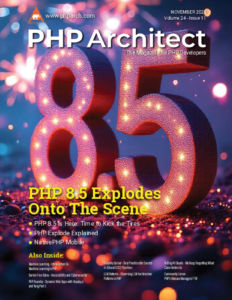Posts marked with “legacy code”
Escaping An Abandoned Framework
In the past few years, I’ve been involved with four teams who built their bread-and-butter applications on the classic Zend 1 framework. Each team realized the framework was no longer supported, and each has struggled to figure out their next step. On each of these projects, I’ve seen triumphs and tragedies. In this article, I […]
Puphpeteer, 25 Years of PHP, and Joe Ferguson
In Episode 24 Eric, John, and Oscar discuss some of the articles in the September 2019 issue “Master of Puppets”. Topics History of PHP, celebrating “25 Years of PHP”, and the Impact Awards at php[world] Using Puphpeteer to automate Chromium browser tasks and testing. Code style, and refactoring legacy code. Code editors from VIM (and […]
Reformat, Refactor, Replace
When your everyday grind is a monolithic, legacy, PHP application from the early 2000s, it can be hard to utilize the newer tools and technologies that are becoming available. Fortunately, there’s a process you can follow to get your application up to date without losing business or logic.
Symfony 4, Legacy Code, the Future of PHP, and Karl Hughes
Eric, John, and Oscar discuss Symfony 4, legacy code, and interview Karl Hughes about what it takes to run a user group.
Renovating Applications with Symfony
The Symfony project has had a profound influence on the PHP ecosystem since its first release in 2005. Projects including Drupal, Laravel, and countless custom web applications, use Symfony components. This month, we look at the new features of Symfony 4 and how to modernize legacy code.
How to Deal With Legacy Code
The general opinion on legacy code is developers don’t like it. This article presents a few ways to deal with legacy code, so it’s an opportunity rather than a source of dread. I hope you’ll change your point of view after reading it.
Can You Migrate Any Legacy Code Under One Month?
According to PHP Framework Trends from Packagist, there were over 1,258 million downloads of open-source PHP frameworks in the last 12 months. That’s a huge number! But how many of them are on the latest version? How many of them are stuck on version 0 or 1, that’s not even on Packagist? Also, how many of you have a custom PHP framework that you hate? What if I tell you there is a way you all could use the latest version of your favorite framework and PHP 7.4 by the end of 2019?
Department of Breaking Changes: Launching PHP 7 in a Highly Available Web World
For many legacy code bases, upgrading to the latest version of PHP 7 presents an opportunity not just to use the latest syntax and features, but to address technical debt and streamline infrastructure. In this article, I’ll share how in moving to PHP 7, the Digital Media team at NPR prepared to make the move […]
Migrating Legacy Web Applications to Laravel
Thanks to Taylor Otwell’s Laravel framework, PHP is reclaiming its rightful place as the go-to language for web application development. For those of us maintaining and developing applications using legacy frameworks, the grass certainly looks greener on Laravel’s side. In this article, I show how to do an in-place migration from a legacy framework to […]
The Workshop: The Road to 7.3, Part Two
Last month we explored the world of static analyzers Phan and PHPStan to find compatibility issues and several other common issues in our PHP Easy Math code base. This month, we’re going to review our code base and implement new and recent features from PHP 7.x



![php[podcast] Episode 24](/wp-content/uploads/2019/09/episode-24-featured-160x84.jpg)











